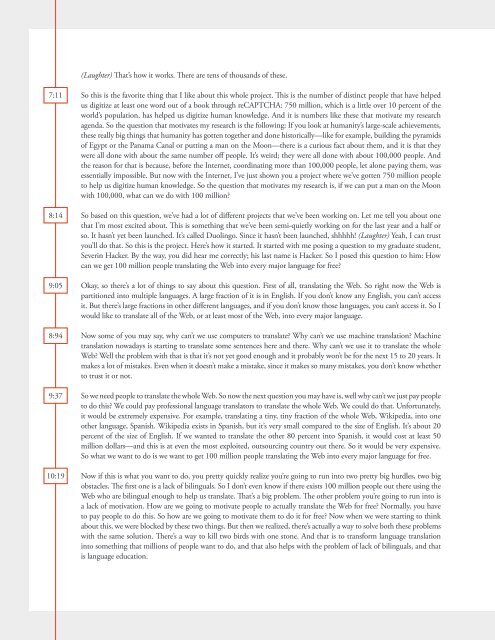Ted Reads
Create successful ePaper yourself
Turn your PDF publications into a flip-book with our unique Google optimized e-Paper software.
(Laughter) That’s how it works. There are tens of thousands of these.<br />
7:11<br />
8:14<br />
9:05<br />
8:94<br />
9:37<br />
10:19<br />
So this is the favorite thing that I like about this whole project. This is the number of distinct people that have helped<br />
us digitize at least one word out of a book through reCAPTCHA: 750 million, which is a little over 10 percent of the<br />
world’s population, has helped us digitize human knowledge. And it is numbers like these that motivate my research<br />
agenda. So the question that motivates my research is the following: If you look at humanity’s large-scale achievements,<br />
these really big things that humanity has gotten together and done historically—like for example, building the pyramids<br />
of Egypt or the Panama Canal or putting a man on the Moon—there is a curious fact about them, and it is that they<br />
were all done with about the same number off people. It’s weird; they were all done with about 100,000 people. And<br />
the reason for that is because, before the Internet, coordinating more than 100,000 people, let alone paying them, was<br />
essentially impossible. But now with the Internet, I’ve just shown you a project where we’ve gotten 750 million people<br />
to help us digitize human knowledge. So the question that motivates my research is, if we can put a man on the Moon<br />
with 100,000, what can we do with 100 million?<br />
So based on this question, we’ve had a lot of different projects that we’ve been working on. Let me tell you about one<br />
that I’m most excited about. This is something that we’ve been semi-quietly working on for the last year and a half or<br />
so. It hasn’t yet been launched. It’s called Duolingo. Since it hasn’t been launched, shhhhh! (Laughter) Yeah, I can trust<br />
you’ll do that. So this is the project. Here’s how it started. It started with me posing a question to my graduate student,<br />
Severin Hacker. By the way, you did hear me correctly; his last name is Hacker. So I posed this question to him: How<br />
can we get 100 million people translating the Web into every major language for free?<br />
Okay, so there’s a lot of things to say about this question. First of all, translating the Web. So right now the Web is<br />
partitioned into multiple languages. A large fraction of it is in English. If you don’t know any English, you can’t access<br />
it. But there’s large fractions in other different languages, and if you don’t know those languages, you can’t access it. So I<br />
would like to translate all of the Web, or at least most of the Web, into every major language.<br />
Now some of you may say, why can’t we use computers to translate? Why can’t we use machine translation? Machine<br />
translation nowadays is starting to translate some sentences here and there. Why can’t we use it to translate the whole<br />
Web? Well the problem with that is that it’s not yet good enough and it probably won’t be for the next 15 to 20 years. It<br />
makes a lot of mistakes. Even when it doesn’t make a mistake, since it makes so many mistakes, you don’t know whether<br />
to trust it or not.<br />
So we need people to translate the whole Web. So now the next question you may have is, well why can’t we just pay people<br />
to do this? We could pay professional language translators to translate the whole Web. We could do that. Unfortunately,<br />
it would be extremely expensive. For example, translating a tiny, tiny fraction of the whole Web, Wikipedia, into one<br />
other language, Spanish. Wikipedia exists in Spanish, but it’s very small compared to the size of English. It’s about 20<br />
percent of the size of English. If we wanted to translate the other 80 percent into Spanish, it would cost at least 50<br />
million dollars—and this is at even the most exploited, outsourcing country out there. So it would be very expensive.<br />
So what we want to do is we want to get 100 million people translating the Web into every major language for free.<br />
Now if this is what you want to do, you pretty quickly realize you’re going to run into two pretty big hurdles, two big<br />
obstacles. The first one is a lack of bilinguals. So I don’t even know if there exists 100 million people out there using the<br />
Web who are bilingual enough to help us translate. That’s a big problem. The other problem you’re going to run into is<br />
a lack of motivation. How are we going to motivate people to actually translate the Web for free? Normally, you have<br />
to pay people to do this. So how are we going to motivate them to do it for free? Now when we were starting to think<br />
about this, we were blocked by these two things. But then we realized, there’s actually a way to solve both these problems<br />
with the same solution. There’s a way to kill two birds with one stone. And that is to transform language translation<br />
into something that millions of people want to do, and that also helps with the problem of lack of bilinguals, and that<br />
is language education.


